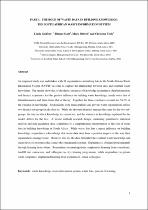 ResearchSpace
ResearchSpace
Part 1: The role of waste data in building knowledge: The South African waste information system
JavaScript is disabled for your browser. Some features of this site may not work without it.
- ResearchSpace
- →
- Research Publications/Outputs
- →
- Journal Articles
- →
- View Item
| dc.contributor.author |
Godfrey, Linda K

|
|
| dc.contributor.author |
Scott, D

|
|
| dc.contributor.author |
Difford, M

|
|
| dc.contributor.author |
Trois, C

|
|
| dc.date.accessioned | 2012-12-06T07:03:54Z | |
| dc.date.available | 2012-12-06T07:03:54Z | |
| dc.date.issued | 2012-11 | |
| dc.identifier.citation | Godfrey, L.K., Scott, D, Difford, M and Trois, C. 2012. Part 1: The role of waste data in building knowledge: The South African waste information system. Waste Management, Vol. 32(11), pp 2154-2162 | en_US |
| dc.identifier.issn | 0956-053X | |
| dc.identifier.uri | http://www.sciencedirect.com/science/article/pii/S0956053X12001833 | |
| dc.identifier.uri | http://hdl.handle.net/10204/6401 | |
| dc.description | Copyright: 2012 Elsevier. This is the pre-print version of the work. The definitive version is published in the Journal of Waste Management, Vol. 32(11), pp 2154-2162 | en_US |
| dc.description.abstract | An empirical study was undertaken with 31 organisations submitting data to the South African Waste Information System (SAWIS) in order to explore the relationship between data and resultant waste knowledge generated through a process of learning. The results show that of the three constructs of knowledge (experience, data/information, and theory), experience has the greatest influence on building waste knowledge, nearly twice that of data/information and three times that of theory. Together the three constructs account for 54.1% of the variance in knowledge. Respondents from municipalities and private waste organisations reflect two distinct sub-groups in the data set. While the theoretical model remains the same for the two sub-groups, the way in which knowledge is constructed, and the variance in knowledge explained by the model, differs for the two. A mixed methods research design, combining quantitative statistical analysis and rich qualitative data, contributes to a comprehensive interpretation of the role of waste data in building knowledge in South Africa. While waste data has a minor influence on building knowledge, respondents acknowledge that waste data does have a positive impact on the way their organisations manage waste. However, it is not the data, but rather the resultant waste knowledge and raised level of awareness that causes the operational response. Experience is obtained predominantly through learning from others. Respondents in municipalities, emphasised learning from consultants, landfill site contractors, and colleagues in city-twinning programmes, while respondents in private waste companies, emphasised learning from experienced, senior colleagues. | en_US |
| dc.language.iso | en | en_US |
| dc.publisher | Elsevier | en_US |
| dc.relation.ispartofseries | Workflow;9875 | |
| dc.subject | Waste knowledge | en_US |
| dc.subject | Waste information system | en_US |
| dc.subject | Waste data | en_US |
| dc.subject | Process of learning | en_US |
| dc.title | Part 1: The role of waste data in building knowledge: The South African waste information system | en_US |
| dc.type | Article | en_US |
| dc.identifier.apacitation | Godfrey, L. K., Scott, D., Difford, M., & Trois, C. (2012). Part 1: The role of waste data in building knowledge: The South African waste information system. http://hdl.handle.net/10204/6401 | en_ZA |
| dc.identifier.chicagocitation | Godfrey, Linda K, D Scott, M Difford, and C Trois "Part 1: The role of waste data in building knowledge: The South African waste information system." (2012) http://hdl.handle.net/10204/6401 | en_ZA |
| dc.identifier.vancouvercitation | Godfrey LK, Scott D, Difford M, Trois C. Part 1: The role of waste data in building knowledge: The South African waste information system. 2012; http://hdl.handle.net/10204/6401. | en_ZA |
| dc.identifier.ris | TY - Article AU - Godfrey, Linda K AU - Scott, D AU - Difford, M AU - Trois, C AB - An empirical study was undertaken with 31 organisations submitting data to the South African Waste Information System (SAWIS) in order to explore the relationship between data and resultant waste knowledge generated through a process of learning. The results show that of the three constructs of knowledge (experience, data/information, and theory), experience has the greatest influence on building waste knowledge, nearly twice that of data/information and three times that of theory. Together the three constructs account for 54.1% of the variance in knowledge. Respondents from municipalities and private waste organisations reflect two distinct sub-groups in the data set. While the theoretical model remains the same for the two sub-groups, the way in which knowledge is constructed, and the variance in knowledge explained by the model, differs for the two. A mixed methods research design, combining quantitative statistical analysis and rich qualitative data, contributes to a comprehensive interpretation of the role of waste data in building knowledge in South Africa. While waste data has a minor influence on building knowledge, respondents acknowledge that waste data does have a positive impact on the way their organisations manage waste. However, it is not the data, but rather the resultant waste knowledge and raised level of awareness that causes the operational response. Experience is obtained predominantly through learning from others. Respondents in municipalities, emphasised learning from consultants, landfill site contractors, and colleagues in city-twinning programmes, while respondents in private waste companies, emphasised learning from experienced, senior colleagues. DA - 2012-11 DB - ResearchSpace DP - CSIR KW - Waste knowledge KW - Waste information system KW - Waste data KW - Process of learning LK - https://researchspace.csir.co.za PY - 2012 SM - 0956-053X T1 - Part 1: The role of waste data in building knowledge: The South African waste information system TI - Part 1: The role of waste data in building knowledge: The South African waste information system UR - http://hdl.handle.net/10204/6401 ER - | en_ZA |





